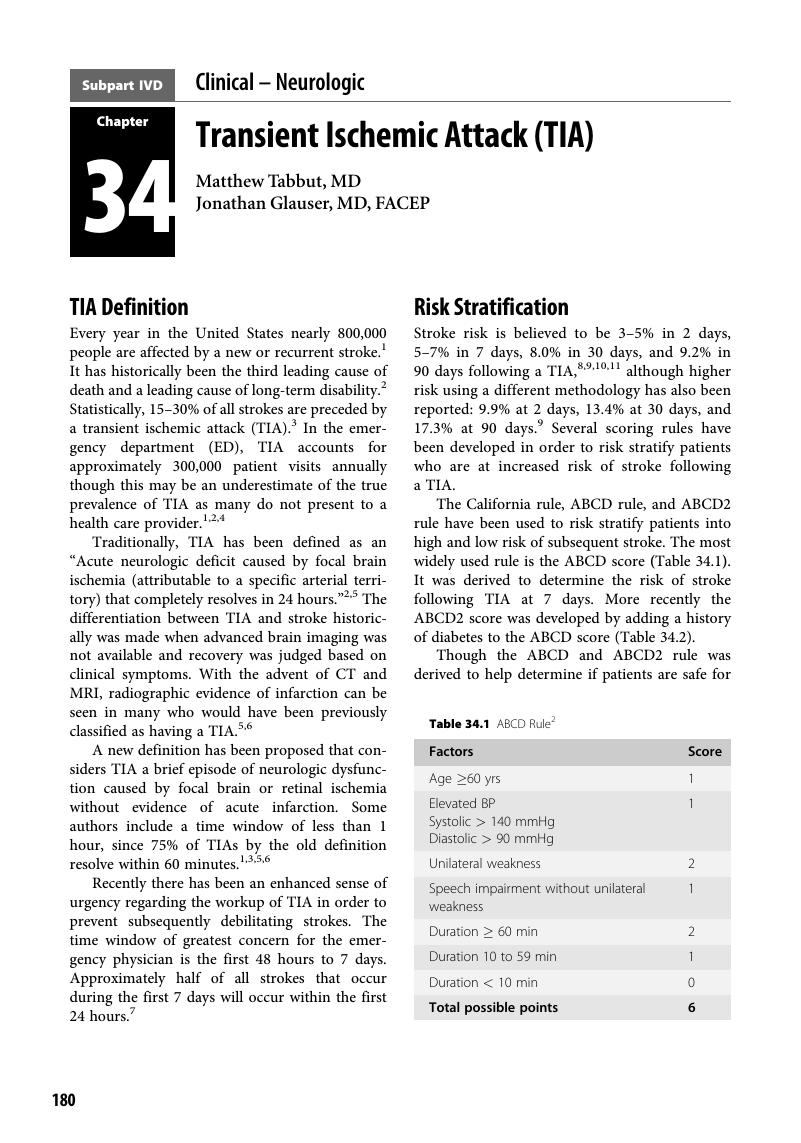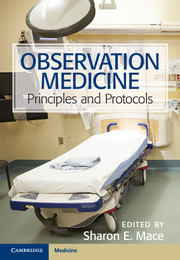Book contents
- Observation Medicine
- Observation Medicine
- Copyright page
- Contents
- Advance Praise
- About the Editors
- Contributors
- Foreword: Onward and Upward
- Preface
- Part I Administration: Key Concepts of Observation Medicine, and Developing and Maintaining an Observation Unit
- Part II Observation Medicine: Clinical Setting and Education
- Part III New Developments in Observation Medicine
- Part IV Clinical
- Subpart IVA Clinical – Cardiac
- Subpart IVB Clinical – Respiratory
- Subpart IVC Clinical – Vascular
- Subpart IVD Clinical – Neurologic
- Chapter 34 Transient Ischemic Attack (TIA)
- Chapter 35 Headaches
- Chapter 36 Seizures
- Chapter 37 Dizziness and Vertigo
- Chapter 38 Central Nervous System (CNS) Shunts
- Subpart IVE Clinical – Metabolic, Endocrine
- Subpart IVF Clinical – Hematologic
- Subpart IVG Clinical – Infections
- Subpart IVH Clinical – Gastrointestinal
- Subpart IVI Clinical – Genitourinary
- Subpart IVJ Clinical – Obstetrics and Gynecology
- Subpart IVK Clinical – Pediatrics and Geriatrics
- Subpart IVL Clinical – Surgical Evaluation
- Subpart IVM Clinical – Pain Management and Musculoskeletal
- Subpart IVN Clinical – Trauma
- Subpart IVO Clinical – Toxicology
- Subpart IVP Clinical – Psychosocial
- Subpart IVQ Clinical – Disasters
- Part V Financial
- Part VI International
- Part VII Evidence Basis for Observation Medicine
- Part VIII Clinical Protocols
- Part IX Administrative Policies
- Part X Order Sets
- Prologue
- Index
- References
Chapter 34 - Transient Ischemic Attack (TIA)
from Subpart IVD - Clinical – Neurologic
Published online by Cambridge University Press: 31 March 2017
- Observation Medicine
- Observation Medicine
- Copyright page
- Contents
- Advance Praise
- About the Editors
- Contributors
- Foreword: Onward and Upward
- Preface
- Part I Administration: Key Concepts of Observation Medicine, and Developing and Maintaining an Observation Unit
- Part II Observation Medicine: Clinical Setting and Education
- Part III New Developments in Observation Medicine
- Part IV Clinical
- Subpart IVA Clinical – Cardiac
- Subpart IVB Clinical – Respiratory
- Subpart IVC Clinical – Vascular
- Subpart IVD Clinical – Neurologic
- Chapter 34 Transient Ischemic Attack (TIA)
- Chapter 35 Headaches
- Chapter 36 Seizures
- Chapter 37 Dizziness and Vertigo
- Chapter 38 Central Nervous System (CNS) Shunts
- Subpart IVE Clinical – Metabolic, Endocrine
- Subpart IVF Clinical – Hematologic
- Subpart IVG Clinical – Infections
- Subpart IVH Clinical – Gastrointestinal
- Subpart IVI Clinical – Genitourinary
- Subpart IVJ Clinical – Obstetrics and Gynecology
- Subpart IVK Clinical – Pediatrics and Geriatrics
- Subpart IVL Clinical – Surgical Evaluation
- Subpart IVM Clinical – Pain Management and Musculoskeletal
- Subpart IVN Clinical – Trauma
- Subpart IVO Clinical – Toxicology
- Subpart IVP Clinical – Psychosocial
- Subpart IVQ Clinical – Disasters
- Part V Financial
- Part VI International
- Part VII Evidence Basis for Observation Medicine
- Part VIII Clinical Protocols
- Part IX Administrative Policies
- Part X Order Sets
- Prologue
- Index
- References
Summary

- Type
- Chapter
- Information
- Observation MedicinePrinciples and Protocols, pp. 180 - 188Publisher: Cambridge University PressPrint publication year: 2017



